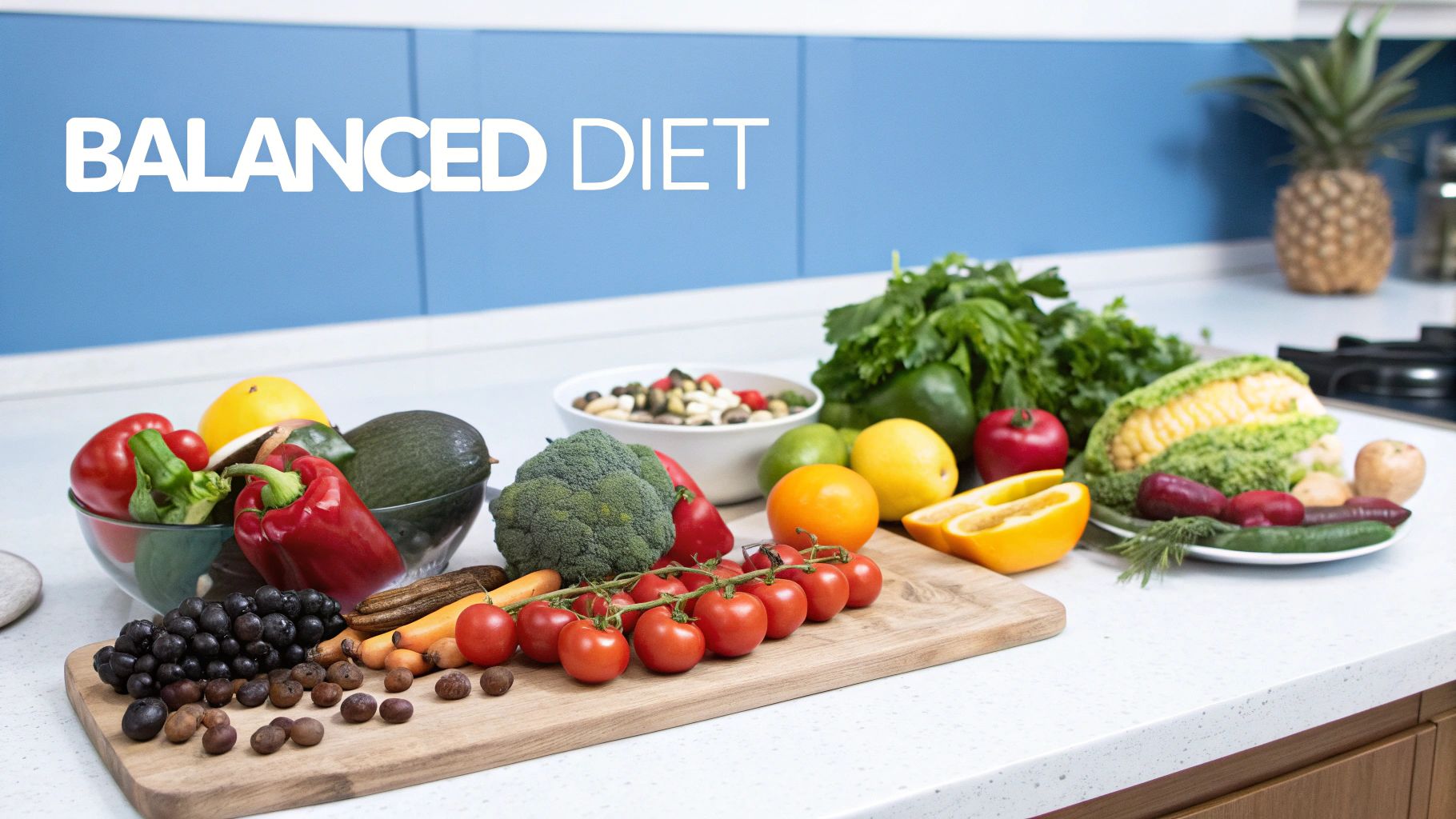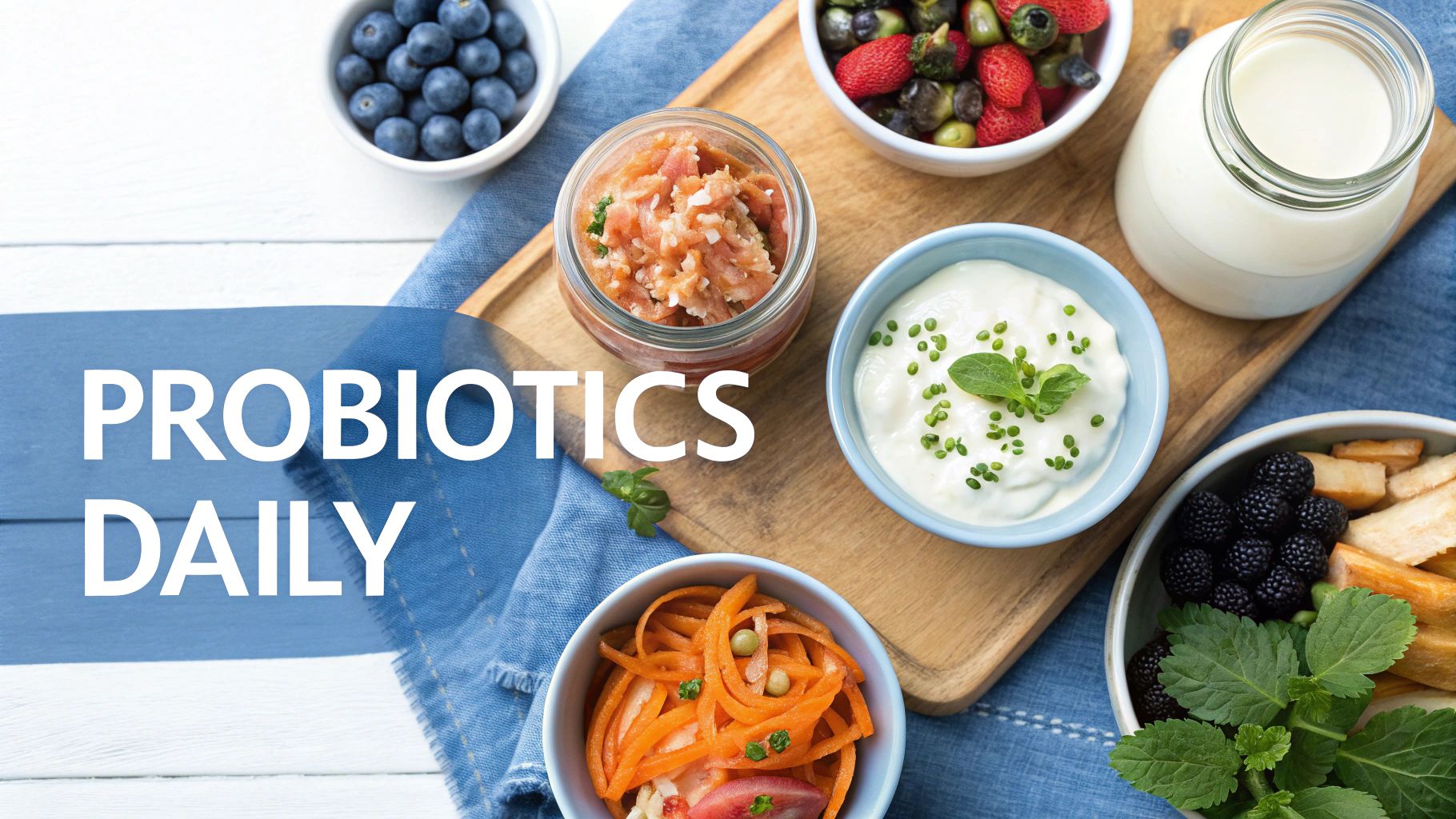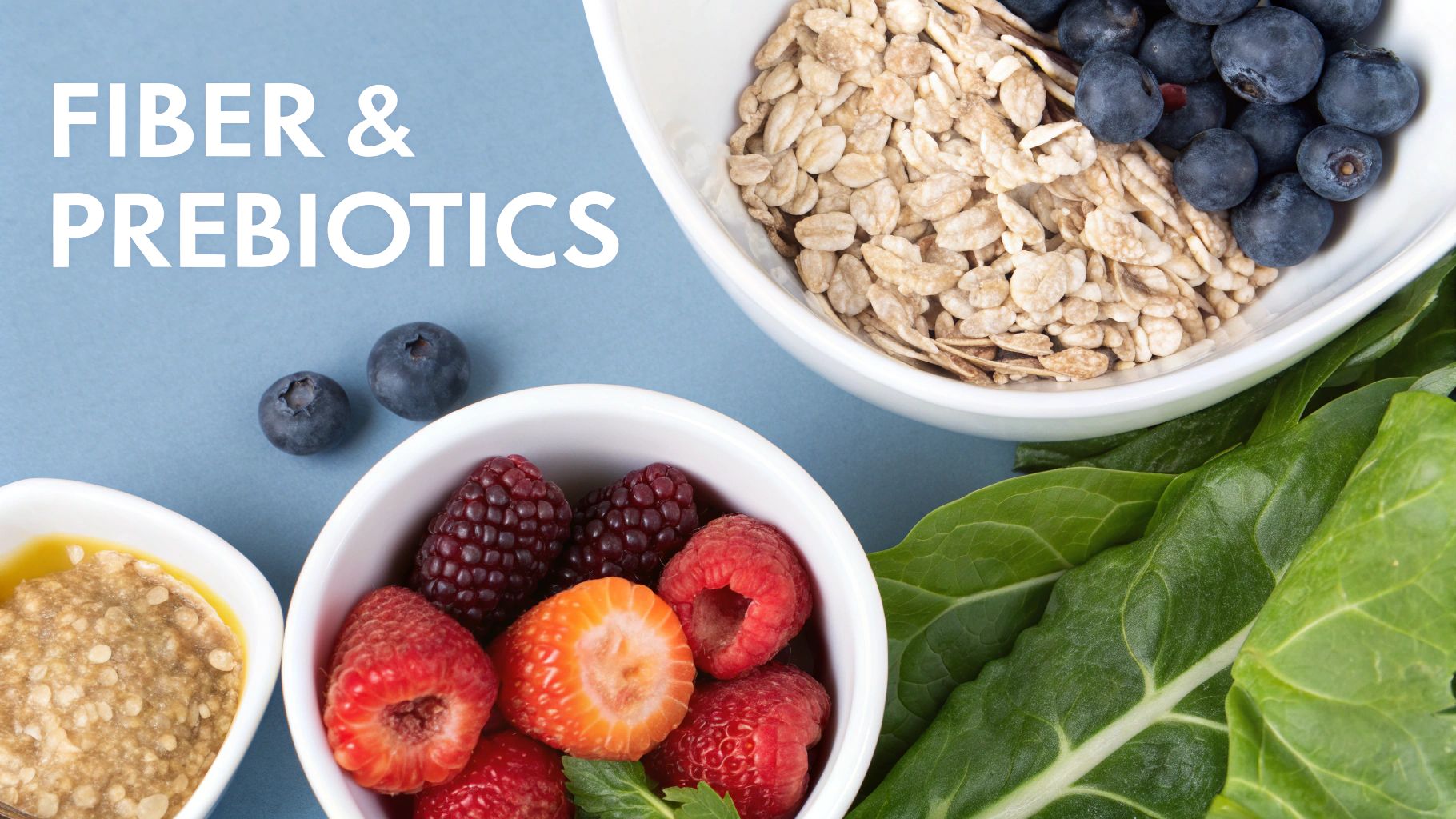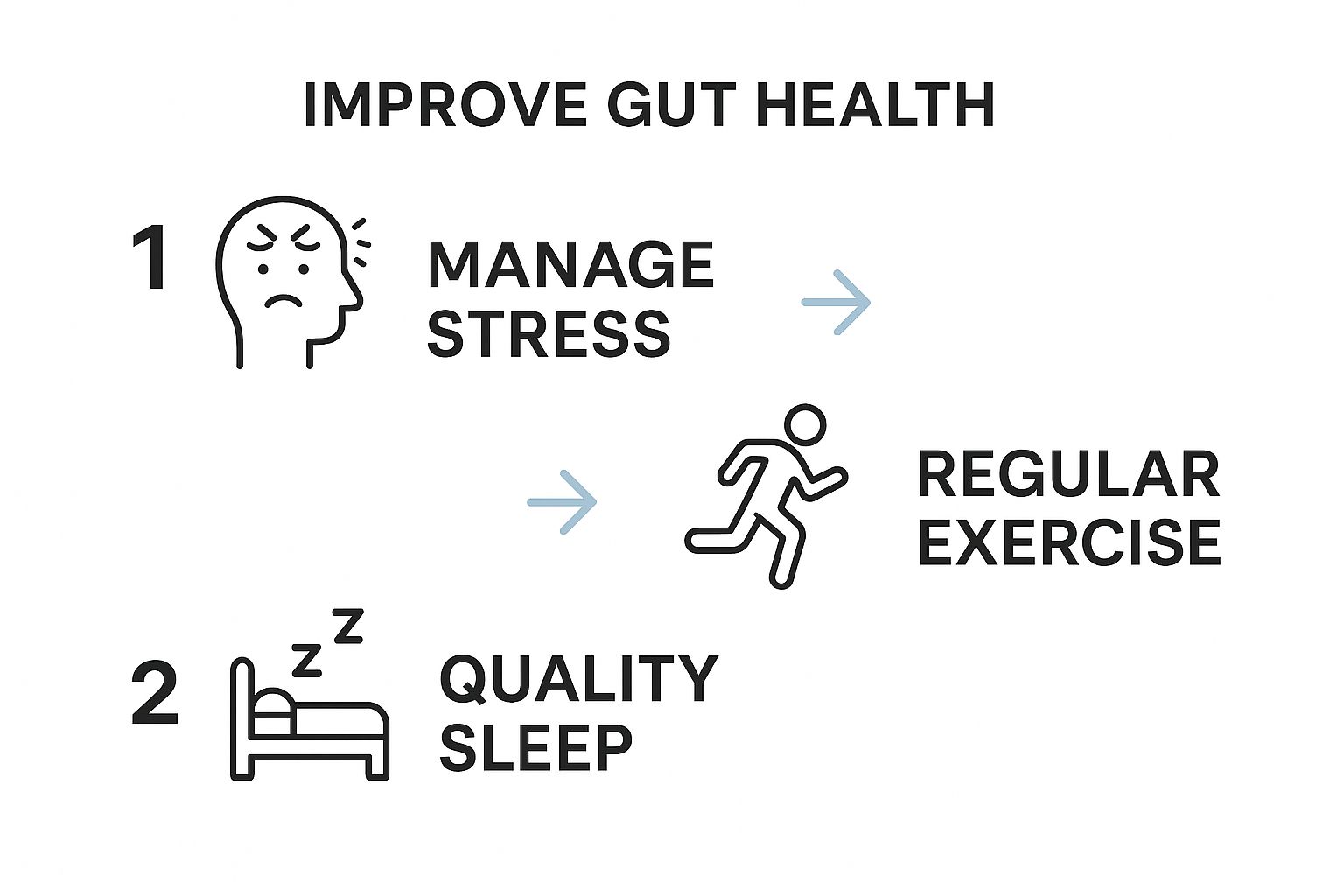When you boil it down, improving gut health comes down to a few key habits: consistently eating fiber-rich and fermented foods, finding ways to manage stress, getting enough sleep, and staying active. It’s the small things you do every day that really make a difference—much more than any expensive, quick-fix solution.
Your Path to Better Gut Health Starts Now
Let's be real, the whole idea of "improving your gut health" can sound like a huge, complicated project. There's so much information out there, it's easy to feel lost before you even begin.
But it doesn’t have to be that way. This guide is all about cutting through the noise and focusing on the simple, practical steps that actually work. No need for a massive lifestyle overhaul overnight. We're going to focus on small, achievable changes that build on each other for long-term results.
Why Gut Health Is a Growing Priority
The buzz around digestive wellness isn't just another health trend. It's a real shift in how we think about overall health, and the numbers back it up. The market for digestive health products is expected to hit $106.03 billion by 2029.
This incredible growth is happening for a reason. People are looking for gut-friendly foods and supplements, and the latest research on the microbiome keeps confirming how important it is. You can dig into these market trends and what’s driving them in more detailed industry reports. It all points to one thing: we’re finally realizing that a healthy gut is the foundation for a healthy life.
Taking care of your gut is one of the most powerful things you can do for your entire body. When your digestive system is in balance, you don't just feel it in your stomach—it can boost your mood, strengthen your immune system, and even lead to clearer skin.
Start with Foundational Foods
The best place to start your gut health journey is with what you put on your plate. To make it easy, I've put together a quick guide to the foundational foods that will get you started on the right track.
Don't think of this as a strict diet. Instead, see it as a simple roadmap for adding more powerful, nourishing foods to your meals every day.
Quick Guide to Foundational Gut-Friendly Foods
| Food Group | Primary Benefit | Examples |
|---|---|---|
| Prebiotic Fibers | Feeds beneficial gut bacteria, promoting a diverse microbiome. | Garlic, onions, asparagus, bananas, oats, apples, flaxseeds |
| Probiotic Foods | Introduces live beneficial bacteria directly into your system. | Yogurt (unsweetened), kefir, sauerkraut, kimchi, miso, tempeh |
| Polyphenol-Rich Foods | Acts as an antioxidant and feeds good gut microbes. | Berries, dark chocolate, green tea, olive oil, red grapes |
| Lean Protein | Supports gut lining integrity without excessive inflammation. | Hemp protein, lentils, chickpeas, fish, poultry |
Use this table as your starting point. Just by focusing on adding a few of these foods into your diet each week, you'll be taking a huge step toward building a healthier, happier gut.
Fueling Your Gut with Probiotics and Prebiotics

Think of your gut microbiome as a garden you're tending inside your own body. To get that garden lush and thriving, you need two things that work hand-in-hand: probiotics (the good seeds) and prebiotics (the rich fertilizer). Getting a handle on how this powerful duo works together is a game-changer when you're learning how to improve gut health.
Probiotics are the live, beneficial bacteria that set up shop in your gut. When you eat them, you're essentially planting good seeds that help bring your internal ecosystem back into balance. While yogurt is the first thing that comes to mind for many, the world of probiotics is surprisingly diverse and delicious.
On the flip side, prebiotics are types of dietary fiber your body can't actually digest. Instead, they make their way down to your lower digestive tract, where they become the perfect food for all those good bacteria you've introduced. Without this vital fertilizer, your probiotic seeds just can't flourish.
Bringing Probiotics to Your Plate
Getting more probiotic-rich foods into your diet is about more than just grabbing a yogurt for breakfast. It's about exploring a whole world of fermented foods, each offering unique strains of helpful bacteria. This variety is what really builds a resilient and robust gut.
Here are some powerful and easy-to-find probiotic sources you can start with:
- Kefir: A fermented milk drink that’s kind of like a drinkable yogurt. It usually packs a wider variety of beneficial bacteria strains than your standard yogurt.
- Sauerkraut: This is just finely chopped, fermented cabbage. To make sure the good bacteria are still alive and active, look for unpasteurized versions in the refrigerated aisle.
- Kimchi: A staple Korean side dish made from fermented veggies, typically napa cabbage and Korean radishes, with a signature spicy kick.
- Miso: This traditional Japanese seasoning is made by fermenting soybeans with salt and kōji. It’s fantastic for adding depth to soups and marinades.
It's clear people are catching on. The global probiotics market jumped from $67.33 billion in 2024 to an estimated $76.35 billion in 2025 as more and more people recognize their importance. Research is backing it up, too—you can dive into the specifics in recent market reports on probiotics.
The Essential Role of Prebiotic Fuel
While adding probiotics is a fantastic start, those little microbes need fuel to do their job and multiply. This is where prebiotic fiber becomes so important. Feeding your gut bacteria is just as critical as introducing them in the first place.
Think back to that garden analogy. Planting the seeds (probiotics) is only half the battle. You have to fertilize the soil (with prebiotics) if you want a healthy, sustainable harvest. A diet packed with both is how you build a truly strong gut.
You can find excellent sources of prebiotics in everyday plant foods you probably already have in your kitchen. Try to work more of these into your meals each week:
- Garlic and Onions
- Asparagus
- Artichoke Hearts
- Leeks
- Chickpeas and Lentils
- Slightly under-ripe bananas
Don't feel like you need to overhaul your entire diet overnight. Simple swaps, like tossing artichoke hearts and chickpeas into your salad or having an apple with nut butter for a snack, can make a huge difference in your prebiotic intake. The goal isn't restriction—it's about making smart, flavorful additions.
If you're also exploring supplements for an extra boost, be sure to check out our list of the top 8 best probiotics for digestion in 2025.
The Surprising Impact of Lifestyle on Your Gut

It's easy to think gut health is all about what you eat. But what happens outside your kitchen—from how you sleep to how you handle a stressful day—plays a massive role in what’s happening inside your gut. To truly improve your gut health, you have to look beyond your plate and see the bigger picture of your lifestyle.
The connection between your brain and your gut is incredibly strong. Ever felt "butterflies" in your stomach before a big presentation? That’s your gut-brain axis at work. When you're constantly stressed, your body pumps out hormones like cortisol, which can do a lot more than just make you feel frazzled.
Chronic stress can directly harm your gut. It’s been shown to increase intestinal permeability—a condition many call "leaky gut"—and throw your delicate microbiome out of whack. This disruption often leads to inflammation and all sorts of digestive issues. If this sounds familiar, you can dive deeper into how to heal leaky gut naturally.
Manage Your Stress for a Calmer Gut
Let's be real: you can't eliminate stress completely. But you absolutely can learn to manage how it affects your body. Even small, consistent habits can make a huge difference.
Here are a few practical ways I’ve found to lower stress and give my gut a break:
- Mindful Moments: Just take five minutes for some deep belly breathing. Inhale slowly through your nose, feel your stomach expand, and then exhale slowly through your mouth. This simple act has a powerful calming effect on your nervous system.
- Nature Walks: A quick, 20-minute walk in a park or any green space is proven to lower cortisol levels. It's a perfect two-for-one: gentle movement and the restorative power of nature.
- Digital Detox: Try setting aside a specific time each day to disconnect from screens. The constant barrage of notifications and information from our phones is a sneaky source of chronic, low-grade stress.
These aren't just fluffy, feel-good ideas. They are science-backed methods for managing the very real, physical impact of stress on your digestive system.
When your mind is calm, your gut can relax. Prioritizing stress reduction isn't an indulgence—it's a non-negotiable part of maintaining a healthy gut lining and a balanced microbiome.
Prioritize Restorative Sleep
Sleep is when your body and brain get to work on essential maintenance, and your gut is a huge part of that cleanup crew. Getting consistent, high-quality sleep is like hitting the reset button for your entire digestive system.
A bad night's sleep can mess with your gut flora just as much as a bad diet. Research has shown that even a few nights of poor sleep can alter the composition of your gut microbiome, often favoring the less beneficial bacteria. The goal? Aim for 7-9 hours of quality sleep every night.
Move Your Body for Microbial Diversity
Finally, moderate exercise is a fantastic tool for improving gut health. And no, you don't need to run a marathon to see the benefits. Things like brisk walking, yoga, or cycling are perfect.
Regular physical activity helps in two major ways:
- It Promotes Regularity: Exercise helps stimulate the natural contractions of your intestinal muscles, which keeps things moving smoothly and can prevent constipation.
- It Increases Diversity: Studies consistently show that active people tend to have a greater variety of gut microbes. This diversity is a hallmark of a healthy, resilient gut ecosystem.
Making movement a regular part of your routine is one of the simplest and most effective things you can do to support your digestion and overall well-being.
Using Intermittent Fasting To Rest Your Gut

One of the best things you can do for your gut is to simply give it a break. That’s where intermittent fasting comes in. This isn’t about some crazy diet; it’s about being smart with when you eat so your gut has enough downtime to rest, repair, and reset.
Think about it: when you’re grazing all day, your digestive system is constantly on the clock. By creating a dedicated "fasting window," you allow it to switch gears from digesting food to performing essential maintenance. This is a game-changer when you're learning how to improve gut health, as it gives your body the space for crucial cleanup that supports a happy microbiome.
How Fasting Helps Your Gut
The real magic happens when you’re not eating. Without the constant demand of breaking down food, your body can finally focus on other critical jobs. One of the most important is autophagy, which is basically your body's cellular cleanup crew. Your cells get to work clearing out old, damaged parts and recycling them. It’s like a deep-cleaning service for your gut lining.
This cellular spring cleaning helps dial down inflammation, a major culprit behind so many digestive woes. Research suggests that fasting can lead to big improvements in digestive efficiency and even boost the diversity of your good gut bacteria. It's catching on, too—surveys in the US, UK, and Australia show that roughly 10% to 15% of adults have given intermittent fasting a try.
If you’re curious about how fasting impacts more than just your gut, we have an article that goes deep into intermittent fasting strategies and their effects on longevity.
The goal of intermittent fasting for gut health isn't about cutting calories—it's about time restriction. The focus is on when you eat, not how much you eat. This simple shift gives your gut the downtime it's been craving.
Getting Started With Intermittent Fasting
The most important rule here is to start slow and really listen to your body. There’s no point in forcing a super strict schedule that just leaves you feeling miserable and deprived. The most common and beginner-friendly approach is the 16:8 schedule.
- How it works: You fast for a 16-hour period and have an 8-hour window to eat your meals.
- A simple example: Finish dinner by 8 p.m. and then hold off on eating again until noon the next day. The best part? You're asleep for most of the fasting window.
During your fast, hydration is key. Stick with zero-calorie drinks like water, black coffee, or your favorite herbal tea.
When it’s time to break your fast, be gentle with your gut. Don't jump straight into a massive, heavy meal, as that can be a shock to your system. Instead, ease back into eating with something light and easy to digest. A smoothie with hemp protein, a warm soup, or a small plate of steamed veggies and lean protein are all great options to gently wake your digestion back up.
Choosing Supplements For Targeted Gut Support
While a food-first approach is the bedrock of good gut health, sometimes your system needs a little extra help. That’s where supplements come in. The supplement aisle can feel overwhelming, but a little know-how can empower you to make smart choices that fit your specific needs. It's a key part of figuring out how to improve gut health, since the right product can really supercharge your efforts.
Of course, before adding anything new to your routine, it’s always a good idea to chat with a healthcare professional. They can help you figure out if a supplement is actually right for you and make sure there aren't any underlying issues to address first.
Decoding Probiotic And Prebiotic Supplements
When you're picking out a probiotic, don't just grab the first bottle you see. You'll want to look for a product that contains multiple, diverse strains of bacteria, because different strains do different jobs in your gut. Also, check the CFU (colony-forming units). To be effective, this number should typically be in the billions.
Prebiotic supplements can also give your good gut bacteria a concentrated dose of their favorite food. Common ingredients like inulin or fructooligosaccharides (FOS) can be a huge help, especially if you find it tough to get enough fiber from your diet. Just a heads-up: for some people with conditions like IBS, these prebiotic fibers can sometimes be hard to digest.
A great piece of advice from gastroenterologists is to test things out methodically. If you decide to try a probiotic, just buy one bottle. If you don't notice any real difference by the time you finish it, that specific formula probably isn't the right fit for you. You can move on and save your money.
The Emerging Role Of Hemp Compounds
Beyond the usual suspects like fiber and bacteria, new science is pointing to other compounds that can support a healthy gut. Certain hemp-derived cannabinoids, for example, work with the body's endocannabinoid system, which helps manage things like gut motility and inflammation. This makes high-quality, full-spectrum hemp products an interesting option for anyone looking for more comprehensive support.
Remember, lifestyle habits are still the foundation of any solid gut health plan. This infographic shows just how connected stress, exercise, and sleep really are.

As you can see, managing stress, staying active, and getting quality sleep work together to create the perfect base for a healthy gut. Supplements can then build on that strong foundation.
Finding Brands You Can Trust
Let's be honest: the supplement industry isn't always tightly regulated. This makes it incredibly important to choose brands that are serious about transparency and quality. Your first line of defense is to always look for products that are third-party tested. This simply means an independent lab has confirmed that the supplement contains what the label says it does and is free from any nasty contaminants.
- Look for Certifications: Seals from organizations like NSF International or USP can give you an extra layer of confidence.
- Check for Transparency: Good brands are open and honest about where they get their ingredients and how they make their products.
If you want a shortcut to finding some reliable options, you might find this guide on the top 8 best gut health supplements for better digestion really helpful. Making informed choices is the best way to ensure your investment actually contributes to your well-being.
Common Questions on Improving Gut Health
https://www.youtube.com/embed/0Aj_RmdIHTw
Once you start getting serious about your gut health, the questions inevitably pop up. It’s easy enough to read about what you should do, but what about when real life gets in the way? I get it.
Let's walk through some of the most common questions I hear. My goal here is to give you straightforward, practical answers so you can navigate your journey with confidence, handle the bumps in the road, and stay on track.
How Long Does It Take to See a Change?
This is the big one, isn't it? And the honest answer is: it really depends.
You might feel some subtle shifts pretty quickly, like less bloating or a bit more energy, within just a few weeks of being consistent. But making a real, lasting change to your gut microbiome? That takes time.
Think of it like tending a garden—you won’t see full blooms overnight. I tell my clients to give it at least 2-3 months of consistent effort. That means prioritizing fiber-rich foods, managing stress, and getting quality sleep. After that, you'll likely notice the more significant, lasting improvements in your digestion and how you feel overall.
The most important thing is consistency, not perfection. A single "off" meal or a stressful day won't derail all your progress. It's the habits you stick with over the long term that create real, sustainable results for your gut.
Will My Gut Get Worse Before It Gets Better?
Sometimes, yes—and it’s usually a good sign! When you suddenly introduce a lot more fiber or fermented foods, your gut microbiome has to adapt. Your existing gut bacteria are getting a totally new kind of fuel, and this can temporarily stir things up, causing a bit of gas or bloating while everything rebalances.
This adjustment phase is almost always short-lived, typically lasting just a few days to a week. If you're feeling some discomfort, try these simple tweaks:
- Go Slow: Don't try to add five new high-fiber foods all at once. Introduce one new thing every few days to give your system time to catch up.
- Stay Hydrated: Water is your best friend here. It helps fiber move through your digestive tract smoothly and prevents things from getting backed up.
- Cook Your Veggies: Cooking high-fiber vegetables breaks them down a bit, making them much easier for your gut to handle than when they're raw.
If your symptoms feel severe or just don't go away, it's always a good idea to chat with a healthcare professional to rule out anything else. But for most people, a little initial turbulence is just a sign that positive changes are happening under the hood. It’s all part of the process.
Ready to give your gut the clean, plant-based fuel it deserves? The journey to better digestion starts with what you eat. Cantein offers premium organic hemp protein powder, designed for easy digestion and maximum nutrient absorption. It's the perfect, simple addition to your daily routine to support your gut health goals. Discover the difference at Cantein.

